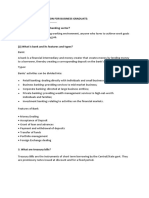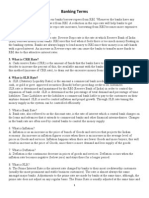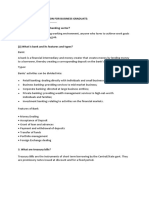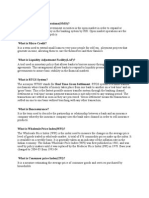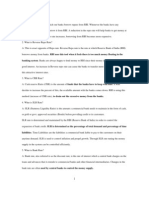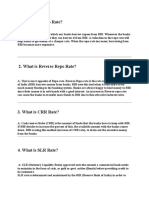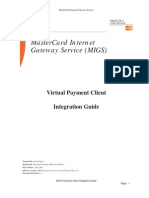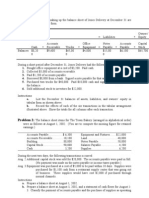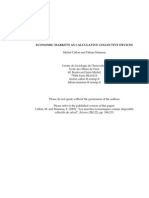Important Banking Terms
Important Banking Terms
Uploaded by
medeepikaCopyright:
Available Formats
Important Banking Terms
Important Banking Terms
Uploaded by
medeepikaOriginal Description:
Copyright
Available Formats
Share this document
Did you find this document useful?
Is this content inappropriate?
Copyright:
Available Formats
Important Banking Terms
Important Banking Terms
Uploaded by
medeepikaCopyright:
Available Formats
Important Banking Terms
SLR (Statutory Liquidity Ratio): SLR is the amount a commercial banks needs to maintain in the form of cash, or gold, or govt. approved securities (Bonds) before providing credit to its customers. SLR rate is determined and maintained by RBI in order to control the expansion of the bank credit. Bank Rate: The interest rate charges by a central bank to commercial banks for very short term loans. CRR (Cash Reverse Ratio): CRR is the amount of funds that the banks have to keep with RBI. If RBI increases CRR, the available amount with the banks comes down. RBI is using this method (increase of CRR), to drain out the excessive money from the banks. Prime Lending Rate (PLR) : The rate of interest charged on loans by banks to their most creditworthy customers. Repo Rate: Whenever the banks have any shortage of funds they can borrow it form RBI. Repo rate is the rate at which commercial banks borrows rupees from RBI. A reduction in the repo rate will help banks to get money at cheaper rate. When the repo rate increases borrowing form RBI becomes more expensive. Reverse Repo Rate: Reverse Repo rate is the rate at which RBI borrows money from commercial banks. Banks are always happy to lend money to RBI since their money is in the safe hands with a good interest. An increase in reverse repo rate can cause the banks to transfer more funds to RBI due to this attractive interest rates. Gross domestic product (GDP): It refers to the market value of all officially recognized final goods and services produced within a country in a given period, usually in one year. GDP per capita is often considered an indicator of a country's standard of livingbut is is not a measure of personal income. GDP per capita exactly equals the gross domestic income (GDI) per capita. Gross national product (GNP): It is the value of all final goods and services produced within a nation in a given year by labour and property supplied by the residents of a country. It adds income earned by its citizens abroad, minus income earned by foreigners from domestic production.
https://www.facebook.com/Krishangoyal1116
International Monetary Fund (IMF): An international organisation that was created in the Bretton Woods Conference of 1944. Its main purpose is to regulate the international monetary exchange system, but has been modified since it creation. In particular, one of the central tasks of the IMF is to stabilize exchange rates of world currencies in a bid to alleviate severe balance of payments problems. Black Market: A black market or underground economy is a market in goods or services which operate outside the formal ones supported by established state power. Typically the totality of such activity is referred to with the definite article as a complement to the official economies, by market for such goods and services, e.g. "the black market in bush meat" or the state jurisdiction "the black market in China". Black Money: Proceeds, usually received in cash, from underground economic activity. Black money is earned through illegal activity and, as such, is not taxed. Recipients of black money must hide it, spend it only in the underground economy, or attempt to give it the appearance of legitimacy through illegal money laundering. NEFT: National Electronic Funds Transfer. MICR: Magnetic Ink Character Recognition or MICR is the bottom line on all checks. It is printed using a special font. SEBI: SEBI is the regulator for the Securities Market in India. Originally set up by the Government of India in 1988, it acquired statutory form in 1992 with SEBI Act 1992 Chaired by U K Sinha. Non-banking financial company (NBFC): A NBFC is a company registered under the Companies Act, 1956 and is engaged in the business of loans and advances, acquisition of shares/stock/bonds/debentures/securities issued by government. ATM: Automated Teller Machine is a machine uses a computer that verifies your account information and PIN (Personal Identification Number) and will dispense or deposit funds per your request)Annuity- Fixed amount of cash to be received every year for a specified period of time.
https://www.facebook.com/Krishangoyal1116
Mobile Banking : With the help of M-Banking or mobile banking customer can check his bank balance, order a demand draft, stop payment of a cheque, request for a cheque book and have information about latest interest rates. Net Banking: Net banking, also called internet or online banking, is the process of conducting banking transactions over the Internet. Viewing bank statements and the status of a bank account online also comes under the definition of net banking. The bank updates accounts and records of transactions almost instantly on the Internet. This form of banking comes with both benefits and scams. Banks need to use enhanced security measures to ensure the safety and privacy of Internet transactions. Mutual funds: Mutual funds are investment companies that pool money from investors at large and offer to sell and buy back its shares on a continuous basis. RTGS (Real Time Gross Settlement) : The continuous settlement of payments on an individual order basis without netting debits with credits across the books of a central bank. Basically, this is a system for large-value interbank funds transfers. This system lessens settlement risk because interbank settlement happens throughout the day, rather than just at the end of the day. Foreign institutional investors(FII) Institutional investors are organizations which pool large sums of money and invest those sums in securities and other investment assets. Foreign direct investment (FDI) Foreign investment refers to the net inflows of investment for a long period of time to acquire a lasting management interest (10 percent or more of voting stock) in an economy. LAF (Liquidity Adjustment Facility): A tool used in monetary policy that allows banks to borrow money through repurchase agreements. This arrangement allows banks to respond to liquidity pressures and is used by governments to assure basic stability in the financial markets. IFSC Code : Indian Financial System Code or IFSC code is an eleven character code assigned by RBI to identify every bank branches uniquely, that are participating in NEFT system in India.
https://www.facebook.com/Krishangoyal1116
CVV: CVV is a new authentication procedure established by credit card companies to further efforts towards reducing fraud for internet transactions. It consists of requiring a card holder to enter the CVV number in at transaction time to verify that the card is on hand.The CVV code is a security feature for "card not present" transactions (e.g., Internet transactions). Bank Rate: The interest rate charges by a central bank to commercial banks for very short term loans. Direct Tax: A direct tax is that which is paid directly by someone to taxing authority. Income tax and property tax are an examples of direct tax. They are not shifted to somebody else. Indirect Tax: This type of tax is not paid by someone to the authorities and it is actually passed on to the other in the form of increased cost. They are levied on goods and services produced or purchased. Excise Tax, Sales Tax, Vat, Entertainment tax are indirect taxes Variable Rate: Any interest rate that may fluctuate over the life of the loan is a variable rate loan or credit agreement. This fluctuation then causes changes in either the payments or the length of the term. This variable rate is often tied to an index that reflects changes in market rates of interest. Bill of exchange: Often known as draft, Bill of Exchange is a document is a third party instrument (written, dated, and signed) containing an unconditional order by a drawer that directs a drawee to pay a definite sum of money to a payee on demand or at a specified future date. It is the most commonly used financial instrument in international trade.
https://www.facebook.com/Krishangoyal1116
You might also like
- 2GO Travel - Itinerary ReceiptDocument2 pages2GO Travel - Itinerary ReceiptJysar Reubal50% (2)
- Units 1 and 2 TextbookDocument360 pagesUnits 1 and 2 TextbookCuong Duong100% (1)
- Credit Card StatementDocument3 pagesCredit Card StatementAashery SiddiqueNo ratings yet
- Regulatory Guide to Money Transmission & Payment Laws in the U.S.From EverandRegulatory Guide to Money Transmission & Payment Laws in the U.S.No ratings yet
- Likert Scale QuestionnaireDocument18 pagesLikert Scale Questionnairemyaim2009No ratings yet
- Questionnaire On ONLINE TRANSACTIONDocument3 pagesQuestionnaire On ONLINE TRANSACTIONrahul928878% (18)
- 35 Common Banking Terms Rates - Asked in Bank PO Interview (With Meaning Definitions)Document5 pages35 Common Banking Terms Rates - Asked in Bank PO Interview (With Meaning Definitions)Kalpesh BhagneNo ratings yet
- Maintaining Price Stability Ensuring Adequate Flow of Credit To The Productive Sectors of The Economy To Support Economic Growth Financial StabilityDocument54 pagesMaintaining Price Stability Ensuring Adequate Flow of Credit To The Productive Sectors of The Economy To Support Economic Growth Financial Stabilityfrancis reddyNo ratings yet
- Banking Awareness PDFDocument22 pagesBanking Awareness PDFnilraj89No ratings yet
- Banking Terminology - 02: India Hands AttractiveDocument5 pagesBanking Terminology - 02: India Hands AttractiveSudhir BeheraNo ratings yet
- Short Questions-Central BankDocument6 pagesShort Questions-Central BanksadNo ratings yet
- Banking Digest - IBPS ClerkDocument37 pagesBanking Digest - IBPS ClerkSaikrupaVempatiNo ratings yet
- Banking Awareness Quick Reference Guide 2015 PDFDocument64 pagesBanking Awareness Quick Reference Guide 2015 PDFRajivNo ratings yet
- Banking Awareness Quick Reference September, 2013Document10 pagesBanking Awareness Quick Reference September, 2013Shanmugapriya AnandanNo ratings yet
- Bank Interview Question For Business GraduateDocument7 pagesBank Interview Question For Business GraduateHumayun KabirNo ratings yet
- Some Key Financial Terms For Various ExamsDocument17 pagesSome Key Financial Terms For Various ExamsGirish NegiNo ratings yet
- Banking TerminologyDocument8 pagesBanking TerminologybmbsnpNo ratings yet
- GK Power Capsule Ibps Po 3Document41 pagesGK Power Capsule Ibps Po 3Pawan KumarNo ratings yet
- Important Questiins For PlacementDocument9 pagesImportant Questiins For PlacementKUMARI PUJA-MBANo ratings yet
- Manidha Naeyam Free IAS Academy: Banking TermsDocument8 pagesManidha Naeyam Free IAS Academy: Banking TermsJefastin RajaNo ratings yet
- Banking Notes For RBI & SBI ExamsDocument3 pagesBanking Notes For RBI & SBI ExamsSankar DasNo ratings yet
- Banking Terms: Bank RateDocument13 pagesBanking Terms: Bank RateRavi KumarNo ratings yet
- Important Banking Financial Terms For RBI Grade B Phase II NABARD DA Mains IBPS PO Mains PDFDocument21 pagesImportant Banking Financial Terms For RBI Grade B Phase II NABARD DA Mains IBPS PO Mains PDFk vinayNo ratings yet
- Top 50 Banking Interview QuestionsDocument7 pagesTop 50 Banking Interview QuestionschoprahridyeshNo ratings yet
- Banking TermsDocument10 pagesBanking TermsdevibalakannanNo ratings yet
- Banking Awareness 2017 Reference Guide For IBPS PO VII PDFDocument114 pagesBanking Awareness 2017 Reference Guide For IBPS PO VII PDFAshutosh KumarNo ratings yet
- What Is Reverse Repo Rate?Document20 pagesWhat Is Reverse Repo Rate?shilpidas738No ratings yet
- Banking TermsDocument36 pagesBanking TermslenovojiNo ratings yet
- Banking TermsDocument24 pagesBanking TermsSatyaki RoyNo ratings yet
- Important Banking & Financial TermsDocument20 pagesImportant Banking & Financial TermsSushmita SinghNo ratings yet
- Banking Terms: Banking Terminology 1. What Is A Repo Rate?Document9 pagesBanking Terms: Banking Terminology 1. What Is A Repo Rate?Ravi AgarwalNo ratings yet
- Banking Terms: 1. What Is A Repo Rate?Document7 pagesBanking Terms: 1. What Is A Repo Rate?Chanky AgrNo ratings yet
- Adequacy Ratio) : Capital To Risk Weighted Assets Ratio Is Arrived at byDocument4 pagesAdequacy Ratio) : Capital To Risk Weighted Assets Ratio Is Arrived at bysandeep sunnyNo ratings yet
- Banking in India NotesDocument11 pagesBanking in India NotesRituraj SinghNo ratings yet
- Financial Term LogyDocument3 pagesFinancial Term LogyPawan KumarNo ratings yet
- Hand Note For Bank VivaDocument15 pagesHand Note For Bank Vivaইরফানুল আলম সিদ্দীকি100% (1)
- Banking Info BankDocument4 pagesBanking Info Bankavl brindaNo ratings yet
- Interview Questions For Bank in BangladeDocument7 pagesInterview Questions For Bank in BangladeKhaleda Akhter100% (1)
- Banking TermsDocument24 pagesBanking TermsBrijesh JoshiNo ratings yet
- What Is Open Market Operations (OMO) ?: Banking TermsDocument5 pagesWhat Is Open Market Operations (OMO) ?: Banking TermsRavi SharmaNo ratings yet
- Bank GKDocument51 pagesBank GKTarun JakharNo ratings yet
- What Do You Understand by The GDP of The Country?Document5 pagesWhat Do You Understand by The GDP of The Country?S.s.SubramanianNo ratings yet
- Banking Sector TerminologyDocument12 pagesBanking Sector TerminologyanirbanujanNo ratings yet
- BIN-101-to-410-VivaDocument242 pagesBIN-101-to-410-Vivamahabbat1426No ratings yet
- Banking Terminologies For Written GKDocument8 pagesBanking Terminologies For Written GKJohn BronzelNo ratings yet
- FM - 19bsp3027Document20 pagesFM - 19bsp3027unnati khandelwalNo ratings yet
- Print NewDocument43 pagesPrint Newshweta25bspNo ratings yet
- Banking TerminologyDocument14 pagesBanking TerminologyArghadeep ChandaNo ratings yet
- Articles On EconomicsDocument27 pagesArticles On EconomicsPRADEEP BARALNo ratings yet
- Bank of Baroda PO Banking Awareness Free PDF Capsule PDFDocument21 pagesBank of Baroda PO Banking Awareness Free PDF Capsule PDFManikandan VpNo ratings yet
- Interview Q&ADocument23 pagesInterview Q&ACarol EvanNo ratings yet
- Banking Terms and DefinitionsDocument36 pagesBanking Terms and DefinitionsARULSHANMUGAVEL S VNo ratings yet
- Viva QuestionDocument11 pagesViva QuestionMH ArafatNo ratings yet
- Money MarketDocument12 pagesMoney MarketNeha RathoreNo ratings yet
- Untitled DocumentDocument12 pagesUntitled DocumentRajeev UpadhayayNo ratings yet
- Banking TermsDocument10 pagesBanking TermsTusharNo ratings yet
- List of Important Banking Terminology (IBPS PO Mains Special)Document5 pagesList of Important Banking Terminology (IBPS PO Mains Special)FarooqKhanNo ratings yet
- What Is A Repo Rate?Document17 pagesWhat Is A Repo Rate?Mani KsnNo ratings yet
- Bank Fundamentals: An Introduction to the World of Finance and BankingFrom EverandBank Fundamentals: An Introduction to the World of Finance and BankingRating: 4.5 out of 5 stars4.5/5 (4)
- Financial Markets Fundamentals: Why, how and what Products are traded on Financial Markets. Understand the Emotions that drive TradingFrom EverandFinancial Markets Fundamentals: Why, how and what Products are traded on Financial Markets. Understand the Emotions that drive TradingNo ratings yet
- Understand Banks & Financial Markets: An Introduction to the International World of Money & FinanceFrom EverandUnderstand Banks & Financial Markets: An Introduction to the International World of Money & FinanceRating: 4 out of 5 stars4/5 (9)
- Absenteeism of Employees at AGRON RemediesDocument55 pagesAbsenteeism of Employees at AGRON RemediesmedeepikaNo ratings yet
- 2012-01-02 203611 Answers2Document9 pages2012-01-02 203611 Answers2medeepikaNo ratings yet
- CH 17Document12 pagesCH 17medeepikaNo ratings yet
- M. LoganathanDocument3 pagesM. LoganathanmedeepikaNo ratings yet
- Additional Question 1 Additional Question 4Document1 pageAdditional Question 1 Additional Question 4medeepikaNo ratings yet
- Matrix Vision System Manual enDocument235 pagesMatrix Vision System Manual enmedeepikaNo ratings yet
- ISO-8859-1 Excel Logical OperationsDocument274 pagesISO-8859-1 Excel Logical OperationsManoj SinghNo ratings yet
- Amit CV2Document4 pagesAmit CV2medeepikaNo ratings yet
- Resume-Amandeep KaurDocument6 pagesResume-Amandeep KaurmedeepikaNo ratings yet
- Cs 412234Document2 pagesCs 412234medeepikaNo ratings yet
- TIPS For The Land Sellers and Buyers in KERALA PPT From James Joseph AdhikarathilDocument33 pagesTIPS For The Land Sellers and Buyers in KERALA PPT From James Joseph AdhikarathilJames AdhikaramNo ratings yet
- Keep Track of Your Transaction Transaction StatusDocument21 pagesKeep Track of Your Transaction Transaction StatusIka NovianaNo ratings yet
- Mathematics - Banking For Icse Grade 10 ProjectsDocument24 pagesMathematics - Banking For Icse Grade 10 ProjectsFluffy Worm39% (18)
- ANZ EGate Virtual Payment Client Guide Rev 1.2Document74 pagesANZ EGate Virtual Payment Client Guide Rev 1.2Nigel GarciaNo ratings yet
- PowerPoint Presentation of Revenue Version of SMEs IFRSDocument42 pagesPowerPoint Presentation of Revenue Version of SMEs IFRSAdenrele SalakoNo ratings yet
- Banking, Currency & FinanceDocument2 pagesBanking, Currency & FinanceAsad ZainNo ratings yet
- Session 4 - Revenue & ReceivablesDocument50 pagesSession 4 - Revenue & ReceivablesThùy TrangNo ratings yet
- Deposit Analysis of NABIL Bank Ltd. (Please Comment After Read This)Document45 pagesDeposit Analysis of NABIL Bank Ltd. (Please Comment After Read This)Suman Babu Panta85% (309)
- WN Op1909 SPS03 enDocument74 pagesWN Op1909 SPS03 enSumitra BalanNo ratings yet
- Banking Important Terms Part 9 WWW - Anujjindal.In Successrbi@Anujjindal - inDocument6 pagesBanking Important Terms Part 9 WWW - Anujjindal.In Successrbi@Anujjindal - inPranav KanungoNo ratings yet
- How To Understand Payment Industry in BrazilDocument32 pagesHow To Understand Payment Industry in BrazilVictor SantosNo ratings yet
- Harrisburg Strong PlanDocument115 pagesHarrisburg Strong PlanPennLiveNo ratings yet
- Problem Set 1 SolutionsDocument15 pagesProblem Set 1 SolutionsCosta Andrea67% (3)
- ACC601 Xero Assignment S1 2020 v1 PDFDocument9 pagesACC601 Xero Assignment S1 2020 v1 PDFbhavikaNo ratings yet
- 1 - Valuing A Crypto-Currency - Do & Don'Ts - AaaaaaaDocument85 pages1 - Valuing A Crypto-Currency - Do & Don'Ts - AaaaaaaAB236No ratings yet
- Law of BankingDocument22 pagesLaw of BankingNathan NakibingeNo ratings yet
- SwapDocument61 pagesSwapKajal ChaudharyNo ratings yet
- Aave v2 WhitepaperDocument14 pagesAave v2 Whitepaperalexander benNo ratings yet
- Preparing A Bank Reconciliation - Financial AccountingDocument14 pagesPreparing A Bank Reconciliation - Financial AccountingsninaricaNo ratings yet
- Afterpay Research PDFDocument33 pagesAfterpay Research PDFNikhil JoyNo ratings yet
- Economic Markets As Calculative Collective DevicesDocument42 pagesEconomic Markets As Calculative Collective DevicesCarlos BarradasNo ratings yet
- Money Transfer - Global Money Transfer - Western UnionDocument3 pagesMoney Transfer - Global Money Transfer - Western UnionMohammed BarakatNo ratings yet
- Financial Instrument SummaryDocument6 pagesFinancial Instrument SummaryJoshua ComerosNo ratings yet
- STARTRADE RO - Comisioane Si Taxe STARTRADE RO - Fees and CommissionsDocument3 pagesSTARTRADE RO - Comisioane Si Taxe STARTRADE RO - Fees and CommissionsAzi NuNo ratings yet
- Interlink Interchange Reimbursement Fees April2012Document3 pagesInterlink Interchange Reimbursement Fees April2012rosekjarNo ratings yet
- AXIS BANK Statement For April 2019Document2 pagesAXIS BANK Statement For April 2019Innovacion Airconditioning100% (1)














